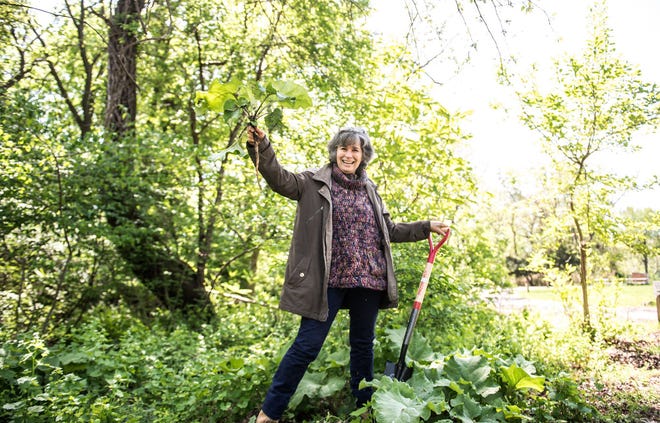
Philadelphia Inquirer article also published in
DetroitNews.com/story/life/food/2019/05/30/5-edible-plants-you-can-forage-your-backyard/1270017001/
An Open Letter to Everyone!
by Lynn Landes
Wild Food deserves a place of honor at our kitchen table,
farmers’ markets, grocery stores, restaurants, and schools. Why? Because
“wild food” is nature's food and completely sustainable. Unlike cultivated
crops, wild food does not
require human intervention for its survival. Homeowners can produce a
great deal of their own "wild" food and medicine in their own yards, while
public parks can let the public pick their produce. Wild food is a hot
commodity gaining fast in popularity!
“Re-Wilding” is a growing movement around the world. The re-wilding movement
recognizes the importance of growing wild foods in a natural setting and
including them in our meals. Consuming wild foods also adds diversity and
nutrition to our diet. Many plants that we call “weeds” are a vital source
of food, fiber, and medicine. And more importantly, wild foods can make the
difference between life or death in times of natural or man-made disasters.
Wild food constitutes an important second or co-harvest for
farmers, which adds to their efficiency, productivity, and income. For many
farmers, the number one “weed”, is Amaranth (a.k.a., pigweed). Yet, Amaranth
is also a “superfood” consumed by millions around the world as a tasty leafy
vegetable and a seed grain. Purslane, Patience Dock, and Lamb’s Quarters
also top the list of wild food for foragers to gather. We want to
encourage farmers
to take advantage of this bumper crop of delicious delectables and
pricey produce.
At the Rittenhouse Square Farmers’ Market
in Philadelphia, renowned forager David Siller and his staff sell wild
edibles like hotcakes, including Stinging Nettle, Fiddleheads, Garlic
Mustard, and Ramps. And the public is showing phenomenal support.
The same could be said for The Wild Foodies of Philadelphia,
a Meetup group that I founded in 2010. Today we have over 6,600
members. The Wild Foodies is a very enthusiastic group who come
from all points on the political spectrum to learn more about the food
right under our feet. They value what nature can provide and are
somewhat distrustful of government and the marketplace. And they have a
point.
To ignore wild food is to turn our backs on Mother Nature and
common sense. Traditional agriculture, with its monoculture and rows of
crops, invites disease and pests and is not sustainable. Whereas, your
typical empty lot on any city is chock full of wild foods growing with wild
abandon. That-right-there should tell us something.
We need wild plants to be recognized and honored for the
priceless gift they are to humanity. "Wild plants and their uses" should be
taught in our schools, sold in stores, served in restaurants, and celebrated
for their nutrition and resilience. To that end, The Wild Foodies of
Philly hosts a website packed full of resource information, free field guides, and
sage advice. We invite the public to visit our website and join our meetup
group. Forage on! With care!
Lynn Landes, Founder
www.WildFoodies.org
https://www.meetup.com/Wild-Foodies-of-Philly